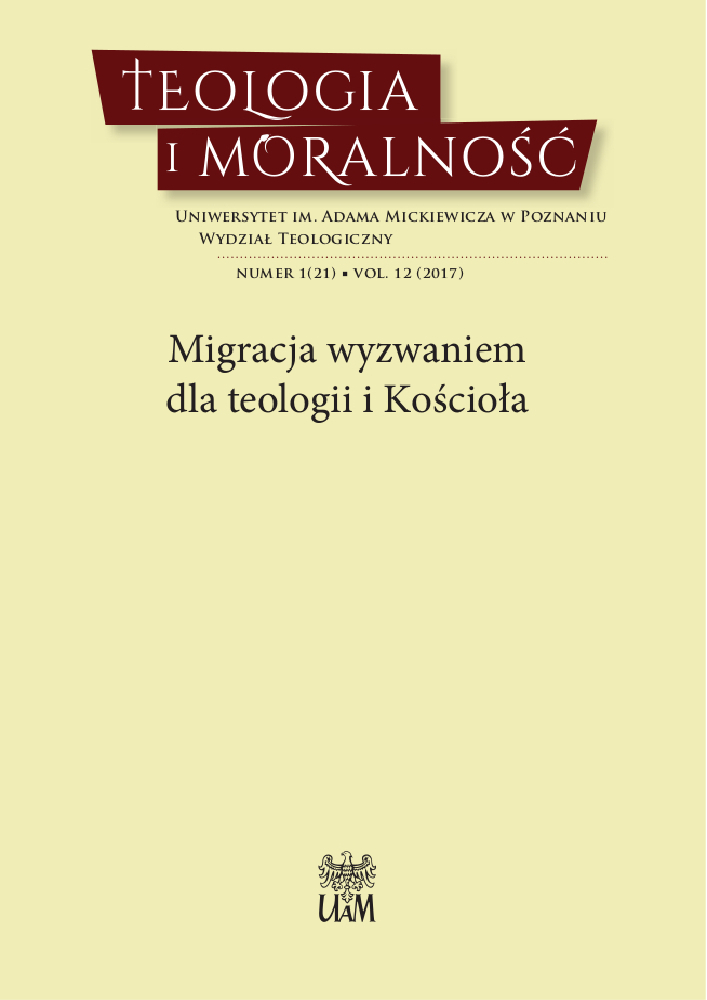Abstract
The article analyzes, present in the Christian tradition from St. Augustine, category ordo caritatis. Presents it from a historical perspective and makes an attempt to show that it is current, as well as shows the possibility of referring it to problems of migration in the contemporary world. The article emphasizes that category ordo caritatis was invoked whenever it was necessary to answer the question: how and who we should help in a situation when we cannot help them all? The author argues that the category ordo caritatis is still current (in a spirit of the conciliar reform) and can be related to contemporary problems of migration. This category prevents from being driven in the process of helping by only emotions, recalls the need for rational actions and the need for logic and order.References
Augustyn, De doctrina christiana – O nauce chrześcijańskiej. Tekst łacińsko-polski, tłum. J. Sulkowski, Warszawa 1989.
Bartoszek A., The Samaritan Paradigm in modern palliative care, „Śląskie Studia Historyczno-Teologiczne” 38 (2005), numer specjalny, s. 179-189.
Glombik K., Miłość Boga, bliźniego i samego siebie – przykazanie i postawa, „Teologia i Moralność” 6 (2009), s. 71-90.
Jan Paweł II, Encyklika Evangelium vitae (25.03.1995), w: Encykliki Ojca Świętego Jana Pawła II, Kraków 1996.
Jan Paweł II, Przemówienie podczas audiencji dla pielgrzymów przybyłych na kanonizację św. Rafała Kalinowskiego (18 listopad 1991), „L’Osservatore Romano” 11 (1991) nr 12, s. 25-26.
Machinek M., Śmierć w dyspozycji człowieka. Wybrane problemy etyczne u kresu ludzkiego życia, Olsztyn 2004.
Noldin H., Summa theologiae moralis iuxta codicem iuris canonici, Vol. II: De praeceptis Dei et Ecclesiae, Lipsk 193926.
Pope S., The order of love and recent catholic ethics: a constructive proposal, “Theological Studies” 52 (1991) nr 2, s. 255-288.
Rońda J., Miłość samego siebie w kontekście życia społeczno-gospodarczego, „Sosnowieckie Studia Teologiczne” 11 (2013), s. 135-144.
Sobór Watykański II, Deklaracja o stosunku Kościoła do religii niechrześcijańskich Nostra aetate (28.101965), w: Sobór Watykański II, Konstytucje. Dekrety. Deklaracje. Tekst polski – nowe tłumaczenie, Poznań 2002.
Sobór Watykański II, Konstytucja dogmatyczna o Kościele Lumen gentium (21.11.1965), w: Sobór Watykański II, Konstytucje. Dekrety. Deklaracje. Tekst polski – nowe tłumaczenie, Poznań 2002.
Tomasz z Akwinu, Suma teologiczna, t. 16: Miłość (II-II qu. 23-46), tłum. A. Głażewski, London 1967.
Vansteenberghe E., Charité. Les grandes écoles théologiques, w: Dictionnaire de Spiritualité, t. 2, cz. 1, Beauchesne–Paris 1953, k. 579-600.
Viller M., Monier-Vinard H., Charité. Charité envers le prochain, w: Dictionnaire de Spiritualité, t. 2. cz. 1, Beauchesne–Paris 1953, k. 649-661.
Wojtyła K., Osoba i czyn, Lublin 19943.
Wyszyński S., Drugie kazanie świętokrzyskie (20 luty 1974), www.non.possumus.pl/ nauczanie (strona internetowa prezentująca nauczanie kard. Stefana Wyszyńskiego) [dostęp: 31.05.2017].
Wyszyński S., Przemówienie do kapłanów stolicy (24 grudzień 1976), www.non.possumus.pl/nauczanie [dostęp: 31.05.2017].
License

This work is licensed under a Creative Commons Attribution-NoDerivatives 4.0 International License.
